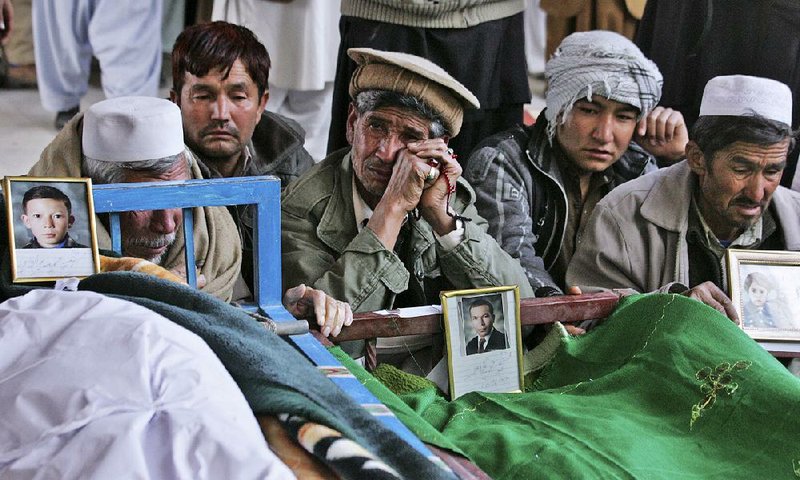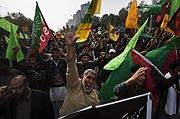QUETTA, Pakistan — Members of the Pakistani Shiite Hazara community Sunday threatened to hold widespread protests if the government did not arrest within 48 hours the people responsible for a bombing that killed 81 people in a southwestern city Saturday.
The blast at a produce market in Quetta underlined the precarious situation for Shiites living in a majority Sunni country where many extremist groups don’t consider them real Muslims. Some 160 people were also wounded.
Most of the dead and wounded were Hazaras, an ethnic group that migrated from Afghanistan over a century ago. Shiite Muslims, including Hazaras, have often been targeted by Sunni extremists in Baluchistan province, of which Quetta is the capital, as well as in the southern city of Karachi and northwestern Pakistan.
The vice chairman of the Hazara Democratic Party, a political group representing Hazaras, said Sunday that the party was giving the government 48 hours to find those responsible for the attack and arrest them.
“Otherwise, the Hazara community will start a protest in Pakistan and the world over,” said Azizullah Hazara.
Graves had been dug, but at least 60 of the dead from the Saturday evening blast still hadn’t been buried Sunday evening. Religious and community leaders were set to meet this morning to decide whether to bury their dead or to protest the bombing by refusing to bury the bodies as they did after a similar attack in January.
“So far, we are not going home. We are not burying the dead,” said Dawood Agha, a Shiite leader in Quetta.
The violence touched a chord among Pakistanis elsewhere in the country, with small-scale protests being held in Islamabad - which is the capital - Karachi and at least 12 other cities.
At the Islamabad rally, hundreds of Shiites and various civil-rights groups demanded the government crack down on the al-Qaida-linked militant group Lashkar-e-Jhangvi, which has claimed responsibility for the attack.
“We all know it is LeJ,” said Hasan Raza, a Shiite activist. “We want the government to act now and take action against the terrorist group.”
The large-scale attack comes as the government, headed by the Pakistan People’s Party, is preparing for elections this spring. The attack adds to the widespread perception that the government has done little to improve security or the economy during its five-year tenure.
Whether that anger will translate into widespread opposition to the People’s Party come election time remains to be seen. Baluchistan, the largest but most sparsely populated province, is a long way from places such as Punjab and Sindh provinces, where most voters live. The protests calling for government action have generally been small-scale so far and limited to mostly liberal activists.
At the blast site, members of the Hazara community helped authorities dig through rubble to find the dead or survivors. Most of their efforts were focused on a two-story building that was completely destroyed. More than 20 shops nearby were also demolished.
Clothing and shoes were scattered through the concrete rubble, while broken steel bars and shattered wooden window frames littered the streets.
Near the rubble, a group of more than 50 women were wailing and beating their heads in mourning.
On a nearby road, Hazara youth burned tires and chanted for the arrests of the killers. A number of Shiite groups also staged a sit-in and were demanding the immediate removal of the chief secretary of Baluchistan and the top police official, said Rahim Jaffery, who heads a Shiite organization called the Council for the Protection of Mourning.
“We are demanding the city [protection] be handed over to the army so that the killing of Hazara Shiites can be stopped,” he said.
According to the advocacy group Human Rights Watch, more than 400 Shiites were killed in 2012 in targeted attacks across the country, the worst year on record for anti-Shiite violence. The human-rights group said more than 125 were killed in Baluchistan province. Most of them belonged to the Hazara community. With two attacks in two months in Baluchistan, that number has already been eclipsed.
Human-rights groups have accused the government of not doing enough to protect Shiites.
Information for this article was contributed by Asif Shahzad and Rebecca Santana of The Associated Press.
Front Section, Pages 2 on 02/18/2013

